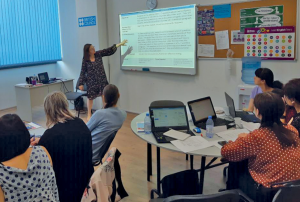Matt Salusbury talks to Ben Grey about the British Council’s English for Journalists course
Why did the US Embassy choose the British Council as a partner on this course?
At the Council, we have a strong reputation in Kazakhstan as a leading authority on ELT, a track record of delivering English and education projects throughout the country and a great network of university partners.
Then, of course, the Council has been involved in a number of similar programmes. Several years ago, in Sudan, for example, I ran an English for an Open Society Programme, funded by the UK Embassy, which primarily focused on teaching English to journalists. In Azerbaijan in 2011-17 we ran a professional development programme funded by a local bank, which trained about 50 journalists in total.
The Kazakhstan programme is funded by the US, and the contract is run through the Friends of the British Council – the American charity that represents the British Council. It is, however, in line with the UK’s strategy not only of encouraging the development of open and democratic societies in Central Asia but also countering the spread of unhelpful narratives from neighbouring states.
The project is popular with the US embassy and has helped improve the British Council’s ties with the US in Central Asia. A high number of high-level American officials have visited the training centres and a desire to provide further funding has been expressed.
How does it fit in with Kazakh government policy?
The government has a policy of promoting the use of English in the secondary and higher education sectors, and its overall aim is to develop a trilingual society in which people can speak and operate in Kazakh, Russian and English.
Most journalists will write in Russian, although there are also many Kazakh language news outlets. Most will also be reliant on Russian-language news sites and similar information sources for most of their content. So, our programme is about supporting the development of a trilingual society and helping to boost media plurality.
What are the language aims?
That depends on the language level of the journalists. We run courses for beginners through to advanced, with students grouped according to level.
For low-level students, we would aim to give them the skills to access English language sources by the end of the course. For higher-level students, we would work with them on interviewing people in English and writing or reporting using English. There is a focus on tasks and exercises that are similar to how they would use English for their work.
Overall, however, the aim is to give journalists the confidence and skills to access a range of English language sources, in a range of formats. So, there is also a focus on using multiple sources, fact checking and understanding that different media outlets have different perspectives.
One challenge we are working on is the fact that many English news sites now have a paywall which means that most of the supplementary materials are taken from just two or three sources (such as the Guardian newspaper and the BBC) and so we are looking – with the US embassy – at paying for access for a selection of sites.
Who are the trainers?
They are all local teachers of English. In Almaty and Nur-Sultan (the capital, formerly called Astana) they are Celta-qualified, with a minimum of three years’ experience. Outside Almaty we deliver the courses in partnership with local universities who nominate the teachers, and then we interview and select them.
They are all trained and supported by the British Council, via specialist courses, organised on an annual basis, which focus on helping them in making their lessons appropriate for the journalists’ needs.
The journalism programme is based around the Cutting Edge series, but teachers are trained to adapt and supplement the content. There is ongoing support, including lesson observations and one-to-one consultations by the British Council Academic Manager.
What is the course structure?
It’s a six-month course, three classes a week. The course format is something we are reviewing, as there is a relatively high drop-out rate for an English course – although actually quite low for a continuing education course.
Journalists are required to commit to attending 60 per cent of the course, lessons are held in the mornings or evenings and their employers have to approve of their participation – so there are a number of measures in place to maximise attendance.
The students are very much a mixed group. They come from TV, radio and Internet outlets – along with traditional newspapers. Motivation is high and almost all understand the importance of English.
English for Journalists
By Ben Gray

The British Council course is an ongoing blended learning programme in which
English language training is delivered to groups of Kazakhstani journalists in eight cities throughout Kazakhstan.
The face-to-face programme is delivered to classes of up to 15 journalists, two to three times weekly, by suitably-qualified local teachers.The British Council is responsible for planning and timetabling the courses, organising the venues, procuring materials, quality assuring the training, and selecting, supporting and managing the teachers. Group levels range from absolute beginners to upper-intermediate.
Journalists also complete a curated online course, English for Journalism, custom-designed by the University of Pennsylvania with input from the British Council Kazakhstan team and other in-country stakeholders. This is integrated into the course, and teachers guide and support the students in completing the modules.
Practising journalists from across all media are sent to study on the programme through the British Council. They need to commit to studying for the whole programme, to explain how learning English will benefit them professionally and to have the written support of their employers.
The course aims to give them the ability to access international English language news and information sources, reducing their current reliance on Russian language media and helping them to access a range of different ideas and viewpoints. It also enables them to communicate with non-Russian or non-Kazakh speaking contacts, and raises their awareness of western professional standards.
The first British Council English for Journalists course in Kazakhstan finished in the summer of 2018, and to date more than 600 journalists have passed through the programme. The courses are ongoing and the aim is to continue them, subject to continued funding.
At end of March the British Council switched to delivering the English for Journalists courses online in response to the Covid-19 pandemic.
Ben Gray is deputy director of the British Council Kazakhstan





